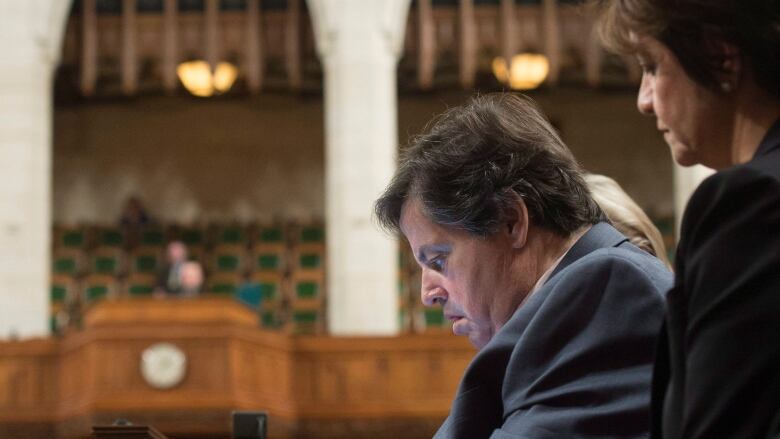O Canada lyric change bill, C-210, approved by Senate committee
With senators expected to rise for holiday break, final votes and passage into law not likely until January

The late Mauril Blanger's private member's bill to make the English lyrics of O Canada gender-neutral has cleared its clause-by-clause review by the Senate social affairs committee.
But with the Senate expected to rise for its holiday break Thursday, the final votes to pass the national anthem bill into law will wait until late January at least.
The House of Commons passed C-210 last June after emotional debates that saw the former Ottawa MP struggle to attend and participate while he wasin the final stages of his battle withALS, also known asLouGehrig'sdisease.
Blanger died last summer. But because his bill was passedby the House before his death, it couldproceed for approval by senators.
- Ottawa MP Mauril Blanger, who died of ALS, honoured at funeral
- Dying MP's gender-neutral O Canada bill passes final Commons vote
After it was sent to the Senate last June, C-210came up for debate on seven separate occasions in the Senate before it finally passed at second reading Dec. 6, meaning it could proceed to the social affairs, science and technology committee.
The committee scheduled two days of hearings on Wednesday and Thursday of this week to consider the bill.
On Wednesday, its sponsorin the Senate, Conservative Nancy Ruth, spoke first about her strong belief that the anthem's line "in all thy sons command" needs to be modernized, changing to the more inclusive lyric"in all of us command."
Another witness in favour, Olympic rowerKristen Kit, told the committee that female athletes who hear the anthem played in their honour at international competitions should be able to hear and sing gender-neutral lyrics.
Literature and women's studies scholar Ramona Lumpkin, the president of Halifax'sMount Saint Vincent University, also appeared as a witness in favour of the change.
'Inclusive the way it is'
On Thursday, the committee heard from two witnesses who were not enthusiastic about the bill.
Chris Champion, the editor of The Dorchester Review, repeated views he'd expressed at the Commons heritage committee earlier this year:the new lyric istoo flat, banal and insipid for a national anthem, in comparison with the previous line of poetry penned byRobert Stanley Weir.
He argued Thursday this rewrite by MPs on behalf of Canadians is"over-politicizing."
He also pointed to the context ofthe 1913 lyric change, whenWeir's original 1908 lyric "thou dost in us command" was revised to "in all thy sons command": war in that era took its toll overwhelmingly on men, he said.
"It's inclusive the way it is. It's become part of who we are. If people don't understand the use of language, we should try harder to transmit our own traditionsrather than change them willy-nilly," he said, arguing too little consultation has been done.
He warned against political correctness and marrying anthem lyrics to the "spirit of the age," which may not stand the test of time.
Stephen Simpson, a descendant of Weir, also appeared at the committee to argue against the change on behalf of his family.
"We in the Weir clan view O Canada as a poetic text not to be tampered with," he said.
The bill is only the latest example of government "meddling" in the song, he said, not unlike howthe lyrics were changed before Parliament adopted itas Canada's national anthem in 1980 to add the words"from far and wide" and "God keep our land."
Despite hearing from these objectors, senators did not amend the bill Thursday and returned it to the full Senate for its final votes of approval.
While not all senators are expected tovote in favour, proponents express confidence there isenough support to pass it when those votes are eventually held.
The bill does not change the French lyrics of O Canada.












_(720p).jpg)


 OFFICIAL HD MUSIC VIDEO.jpg)
.jpg)



























































































